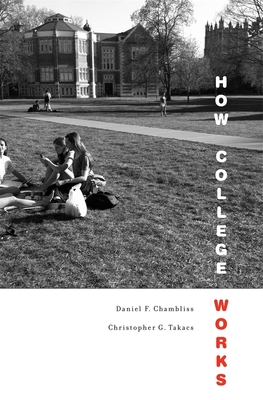

 Harvard University Press
Harvard University Press
How College Works


Key Metrics
- Daniel F Chambliss
- Harvard University Press
- Hardcover
- 9780674049024
- 9.3 X 6.3 X 1 inches
- 1.05 pounds
- Education > Higher
- English
 Secure Transaction
Secure TransactionBook Description
Constrained by shrinking budgets, can colleges do more to improve the quality of education? And can students get more out of college without paying higher tuition? Daniel Chambliss and Christopher Takacs conclude that the limited resources of colleges and students need not diminish the undergraduate experience. How College Works reveals the surprisingly decisive role that personal relationships play in determining a student's collegiate success, and puts forward a set of small, inexpensive interventions that yield substantial improvements in educational outcomes.
At a liberal arts college in New York, the authors followed a cluster of nearly one hundred students over a span of eight years. The curricular and technological innovations beloved by administrators mattered much less than the professors and peers whom students met, especially early on. At every turning point in students' undergraduate lives, it was the people, not the programs, that proved critical. Great teachers were more important than the topics studied, and even a small number of good friendships--two or three--made a significant difference academically as well as socially.
For most students, college works best when it provides the daily motivation to learn, not just access to information. Improving higher education means focusing on the quality of a student's relationships with mentors and classmates, for when students form the right bonds, they make the most of their education.
Author Bio
Appointed to the faculty in 1981, Dan Chambliss, the Eugene M. Tobin Distinguished Professor of Sociology, has written numerous articles and books, including How College Works (2014), with Christopher Takacs ’05, which received Harvard University Press’ Stone Prize for outstanding book on education and society.
In 2018, the American Sociological Association awarded Chambliss its Prize for Scholarly Contributions to Teaching and Learning Teaching. His interests include higher education, formal organizations, social psychology, and research methods.
He holds a doctorate and master’s degree from Yale University and a bachelor’s degree from the New College of the University of South Florida. Chambliss has directed the Mellon Foundation Project for Assessment of Liberal Arts Learning and Hamilton’s New York City Program, and chaired the Sociology Department and the Committee on Gender Equity in Athletics.
Education
Ph.D., Yale University
M.A., Yale University
B.A., New College of the University of South Florida
Source: Hamilton
Videos






Community reviews
Write a ReviewNo Community reviews